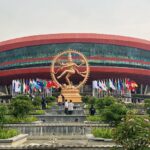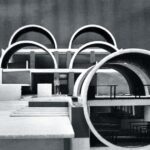Summary: “I was once an industrialist-businessman with my own profitable pharmaceutical firm which was once listed on the New York Stock Exchange. Last year, without telling me, my partners changed the firm’s name and the locks on the office door. I now live with my parents because I also lost my house in a fire some time ago. My wife and children migrated to Australia without leaving an address. Now my parents are thinking of getting me admitted into an old age home and asking a construction labourer’s family to adopt me. I feel fortunate to be alive.”
He stood in the bathroom naked, waiting for the shower to rain on him. On the street below, traffic stopped and started, car engines sputtered, horns blew, school children were run over, all that happens on a normal day in Patna. Waves of June heat rose from the sidewalk. He wiped the perspiration from his forehead and realized he hadn’t installed a shower. Slumping down into a plastic chair, he reached for the fan switch but the blades remained motionless. Irritated, he flicked the switch again, up down, up down, and then suddenly remembered that the local power station had diverted his electricity supply to illegal factories nearby run on cheap child labour. He cursed loudly and shouted for his wife but nobody answered.
Depressed, he lay down on the nylon rug and pondered over his life.
“Here I am at seventy two, still relatively young, with so much to be accomplished.”
His friend Victor, who was only sixty eight had begun smoking at an early age, and could opt for the ‘Smoking’ or ‘Non-Smoking’ zones in a restaurant. He could exercise his choice. Another had done an MA in Stamp Collecting from MIT and owned one of Bihar’s finest stamp collections, including rubber stamps from a wide range of government departments. He felt dejected and jealously sick of their accomplishments. Still sweaty and tired, he wore a new pyjama and headed to the roadside tea stall.
The only Hindu in a deeply devout Muslim family of seven, he was born in a small village in eastern Bihar. He was named Atmaram. His father, Muzzafar Khan, was a renowned nuclear physicist and his mother, Jabeen Khan, a scholar of Hebrew literature. In remote tribal Bihar, however, their prospects of employment were low since they had no use for a nuclear physicist or a Hebrew scholar. So they remained impoverished like the other thirty thousand families in the village, relying on Rockefeller Foundation and USAID for grants dispensed through an NGO, to eke out a living. At a very early age, Atmaram had learnt the scientific concept of mathematical progression, and became so good at it that he could count backwards from 10 to 1, halting only when he encountered an odd number. His father hoped that one day his son would work for NASA, even doing a countdown for the Apollo shuttle launch.
When he hit forty he decided to make monumental changes in his life.
“Maybe I’ll start a family,” he thought.
In order to put his full weight behind the effort, Atmaram hired a tutor who would help him upscale his education. He worked hard, slogging day and night, completing his homework diligently, even passing interviews, but not ending up anywhere. He was still waiting for the day when he could have a family of his own. But no luck. For many years he remained alone. He would often walk into a movie hall or take a summer vacation with unknown families laughing, joking and pretending he was one of them, seeing films he would never see, trekking up to Machu Picchu for weeks when all he wanted was to remain at home and watch the evening news. Eventually, out of sheer frustration, he bought a family of seven at a forty percent summer discount sale at the Patna Urban Family Fair. They were an American missionary family from Utah with five perpetually smiling children. One night, they converted him into a Mormon, presented him with a fat black book and a white suit and left for Bangladesh.
Lonely and bereft, he married Queen Victoria, who resided in the larger-than-life stone statue in the park opposite his house. She was a big woman and during their early days of courtship, he would sit on her lap, the two spending hours together, unmoving and completely smitten. Sadly, soon after marriage they drifted apart, citing cultural differences. In reality, it was he who couldn’t adapt to all the fussy requirements of royal life–the endless pigeon shit and the constant hosing down by the park mali. A bitter divorce ensued and he was alone again.
That same year, Indira Gandhi declared the Emergency. Someone told him there would be knock on his door and he would be arrested. He had no idea why, but he wouldn’t risk it. So he went into hiding under his bed, emerging two years later to find that a beautiful Swedish student, doing Buddhist Studies, had occupied his bed all the while.
“So that’s why there was a sag in the middle,” he said jovially when he emerged. The two became such good friends that he continued to have the girl stay on his bed and he returned below it.
Once the Emergency was over, he decided to take up social service. For two months he served as Rifle Instructor at the Blind School, even killing a few students in the bargain. But as they were blind, they couldn’t tell who had died and he felt relieved of the burden of whether to bury or to cremate them. But there was a niggling feeling in his brain that his was not the most appropriate job for a school for the blind. So he became a member of the Communist Party and collected whatever Marxist insignia and paraphernalia he could lay his hands on, for his drawing room wall. He hoped that he may one day meet Lenin or Marx at the weekly party meetings in Patna. However, he soon grew disillusioned and gave up his party membership when he found it didn’t get him a discount at the new Wal-Mart store. He sold his membership for a small profit on E-Bay to an up-and-coming millionaire who wanted to be seen as a ‘man of the people.’
“I want to be remembered as a generous man,” he told a pedestrian peeing against a temple wall and received a companionable light spray in response. His life went from bad to worse and back to bad again. He couldn’t figure out what he was doing wrong since he wasn’t doing anything at all. With no experience of any sort, he was rejected from a number of possible employment opportunities‒coolie, nose-hair barber, mountain climber, dental flosser, disease carrier, even bottle opener. Completely bereft, Atmaram grudgingly accepted his appointment to the National Planning Commission in Delhi, where he would have to serve a five-year tenure as Head of Rural Reforms.
One afternoon, after a seminar on Snake Charming and Rural Upliftment in Delhi’s Vigyan Bhavan, he had to attend another session on The Role of Mango Seasoning in Coastal Village Cuisine during which he had a massive brain haemorrhage and lay for six weeks in intensive care at the All India Institute of Astrophysics as no beds were available at the All India Institute of Medical Sciences. With tubes stuck in his nose and white-coat scientists rushing in and out of Hadron Colliders, he had plenty of time to dwell on his future.
“My life has been pointless,” Atmaram thought. “The present is hell and the future looks bleak. All the good things have already happened in the past–my birth, my polio shot, my last will and testament.”
For a while he thought about killing himself by reading the fine print on his medical policy but couldn’t find his reading glasses. Then, not one to wallow in self-pity, he quietly removed the respirator tube from his face, attached it to a stray dog sleeping below his bed and left, determined to make good.
His friend, Talib, was a successful guard with the State Bank of NOIDA, his cousin, Dileep ran a financially viable tea stall on GT Road where he fried samosas and contributed to the economy and staved off the unemployment crisis. They were both career professionals with clear ideals and long-range goals. Atmaram hadn’t been to guard school or tea stall school. His future lay elsewhere. He was aware that there was money to be made in other ways‒ drugs, accounting, gambling, insurance, even prostitution (he had briefly known a famous prostitute who even had her own bungalow in Delhi’s Lutyens zone). Experience told him that a successful business required three things‒a good address, a bank loan and an attractive receptionist. With everything going according to plan, he got a set of visiting cards printed and rented a barsati in Defence Colony, explaining to the eighty-year old landlady that her home would now become an important social hub. He had a good address, a bank loan and an attractive receptionist and was good to go. It was unlikely that he could become a tech-giant or a champion of industrial productivity and brand innovation, so a brothel appeared to be a good idea. Some of the early candidates who applied had a sinister come-hither look and wore tight provocative garments with which he wasn’t entirely comfortable. He was running a clean establishment and didn’t want to raise any eyebrows. So he got his sari-clad receptionist to do the job. For the gambling side of the establishment he was unable to procure a slot machine from Vegas, so he got hold of a defunct ATM machine from a State Bank of India auction and installed it in the ‘Casino’ section of his office, near the xerox machine. Then to shield himself from legal action, he would need to wield political clout and hire local operatives for drugs in order to be a viable proposition. He bought aspirin and Combiflam from Prakash Chemists and waited.
After a slow beginning, business gathered momentum and began to grow from a small one-room barsati outfit to a two-room one, then a whole house, to a company to a multinational corporation. Money poured in and he was obliged to hire another two fully-clad and socially presentable secretaries. Still hoping to get listed on NASDAQ and the New York Stock Exchange, he eventually sold the firm to one of the new secretaries for a minor loss. She paid him a lump sum which she removed from her cleavage and sent him on his way. Why he sold his business of sex and drugs at the peak of his success is still a mystery even to himself.
He now lived in a one room shanty in the slums of Kalkaji. He considered it his immense good fortune that he had small savings that would tide him over for a brief period. So he gave in to a sudden creative impulse which impelled him to join a drawing school run by the voluptuous Mrs. Sachdeva. He enjoyed the experience, making many new friends with the toddlers he met in class. Soon after graduation from the drawing class, he enrolled with the police where, given his talent, he was entrusted with the task of drawing floor outlines of murder victims in chalk. Art critic, Eknath Menon, noticed his fine line-work and recommended him for a one-man show at the National Gallery in Delhi. There he met other police artists, many working with coloured chalk.
The ‘art’ experience revived in him a belief in the concept of existence. He, however, discounted the notion of reality as absurd and could find no evidence for it, at least not in Patna where he was invited sometimes to lecture. He would often say, “the meaning of self and the value of existence have no bearing on the quality of life,” and then ask a passer-by what it meant. He spoke briefly at the Patna Institute of Philosophy which was strategically located near Manorama Textiles near the tyre repair shop and Jha’s Photostat Paradise. He spoke about existential nothingness and why it happens only after a heavy meal, but found that he was in the men’s room, where the audience was preoccupied with other things.
Around that time, revved up by his philosophical bent of mind, he had begun to ponder on the mysteries of life, even creating a philosophy that would guide his future.
“If I know myself, is that sufficient? Should I know some other people too? What then about animals? Once I know them, then what? I’ll have to feed them, take them for a walk. What if the apartment doesn’t allow pets?”
These ideas haunted him right into middle age. He was delighted when he procured tenure at the Bihar Academy of Longevity in Patna for his work on Death and Genetics. His research on three generations of families whose older members passed away due to old age, furnished sufficient proof to his hypothesis that death was genetic and happened only to those who had a prior history of death in the family.
Although he was keen to write a book on his philosophical ideas, the ink in his ballpoint-pen had dried and the project had to be abandoned. Around that time he was kidnapped by the Patna branch of the Janata Dal. Mistaking him for Chintu Rajan, the famous industrialist, the Janta Dal office sent a ransom demand of ten million rupees to his father, Mintu Rajan, to be paid in three rupee coins so they couldn’t be traced. The money was to be deposited in the bank account of a construction labourer with an Aadhar card so that it could be accessed by just about anyone except the labourer.
The kidnappers were seasoned politicians in the state cabinet. They assumed that Chintu Rajan, being the son of a rich industrialist, must be used to luxury. So they kept him trussed up in the ballroom of the Patna Sheraton.
“Keep him comfortable under the chandelier,” instructed the chief kidnapper and Speaker of the Bihar Assembly who kept himself blindfolded to avoid identification.
Imprisoned in the ballroom with his blindfolded captors, he carried on valiantly, maintaining a brave front, occasionally eating at the buffet whenever the ballroom was rented for a wedding celebration.
Seven months had passed since the kidnapping. A close bond had developed between the victim and the kidnappers. Later that year, when the wedding season came around and the ballroom was booked for three different marriages on the same night, he was mistaken for one of the bridegrooms. After an elaborate wedding ceremony, he was whisked away, unbeknownst to the kidnappers, into a joint family so large and garrulous that he never figured out which one was supposed to be his wife. He nonetheless spent a happy five years in a twelve-bedroom mansion on Patna’s south side, fathering three children and working as Chief Production Manager in the family-run factory. He kept his hands tied to continually remind himself of his terrible ordeal. To the very day that the chauffer dropped him off in the family Mercedes at a remote forest area north of the city. He had no idea what the family did, who they were, and why, after five years of a loving relationship, they abandoned their favourite son-in-law like a without even a tiffin box or a Pepsi.
He managed to untie his hands by rubbing vigorously against the rough bark of a tree and then walked towards the city, towards the railway station. He wanted to see if his long-standing application for a station coolie at Patna railway station had been approved. He was just in time before the job was about to be given to a burly middle-aged man who could carry seven suitcases piled one on top of the other, two under his left armpit, one slung over his left hand, two under his right armpit and one slung over his right hand. He was a veritable luggage turbo, even managing to hang one around his neck and one between his jaws.
Atmaram’s name was listed in the ledger before the luggage turbo and hence managed to get the job.
“Phew!” he thought. “Luck is on my side!”
But while carrying a suitcase across the tracks for a Marwari family, he paused to urinate and was run over by the 242 Down Begusarai Express. He survived the accident, but was also hit by the Cooch Bihar Janata Passenger speeding on the neighbouring track. Sadly, he was unable to deliver the suitcase on time, thereby losing his tip and part of his foot.
He opened the suitcase just to see what it contained. He found it contained the codes for some deposits in a bank-locker together with a key. He quickly handed it to the local police station.
“One day when I’m gone,” he thought, “people will remember me and ask, what kind of a person was he? Did his life make a difference to the planet, or did his death? Maybe they’ll say he did no harm…he neither hurt nor killed anybody.” He was fiercely patriotic and always stood for the National Anthem‒at a movie theatre, in the toilet, in bed. Before the election he checked which candidate was most likely to win and voted for him. In his public life he was a man of scruples, always paying for his bus ticket and diligently showing the stub to the conductor even when not riding the bus. His daily diary of activities was an exciting record for posterity, the stuff of imagination. Tuesday, July 7: Go to market, buy milk. Discontinue Indian Express. August 3: Water neighbour’s plant. September 4: buy Eveready batteries for dead clock. Over the years his writing filled seven volumes. He thought vaguely about applying for a Pulitzer but couldn’t find the address.
Whenever he was alone, he sowed seeds of kindness and hope. Though he didn’t know too many people, he once partook of a meal with a stray dog that the dog kindly shared with him. And so much of his life was an experiment with urban norms. He even asked a policeman to write him a speeding ticket for walking too fast on the sidewalk, just for the experience. Ordinary life could be filled with so many precious moments of private illumination, so much grace.
He knew he had done well for himself. He stood naked in the bathroom. On the street below, traffic stopped and started, car engines sputtered, horns blew and school children were run over. Patna streets were crowded at all times of the day.




